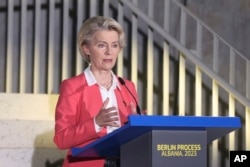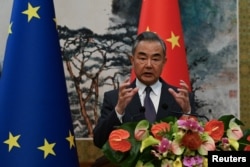Officials from the European Union and China will hold their first in-person summit since 2019 this week, with leaders from both sides expecting to exchange views on strategic and global economic issues.
Some experts say a focus of the one-day summit on December 7 will be “de-risking,” which relates to the EU’s current effort to reduce reliance on China in key sectors.
“Brussels wants to show that they have new policy tools to get serious with de-risking, while the key objective for China is to try to hinder the EU’s progress on implementing policies related to de-risking,” Grzegorz Stec, an analyst at the Brussels office of the Mercator Institute for China Studies, or MERICS, told VOA.
The summit comes amid a deepening rift between the two sides, as the EU hopes to level the playing field in trade while Beijing tries to highlight the need to maintain bilateral cooperation. It follows a series of high-level dialogues, including a visit to Beijing by the EU’s top diplomat, Josep Borrell, in October.
With the EU and China both trying to safeguard their interests, some analysts say expectations for the summit’s outcome should be low.
“It’s like they are driving on two opposite lanes and there is very little common ground between both sides’ talking points,” Sari Arho Havrén, an associate fellow at the Royal United Services Institute, told VOA by phone.
During a keynote speech at a conference in Berlin last month, EU Commission President Ursula von der Leyen doubled down on the need for the EU to investigate Beijing’s state subsidies for the electric vehicle industry. Carmakers in Europe have expressed concern over China’s abundant supply of subsized electric vehicles, which can be sold at cheaper prices in global markets.
“[The overcapacity] will worsen as China’s economy slows down, and its domestic demand does not pick up,” she said, adding that it would worsen distortion in the EU market, which Brussels couldn’t accept. “Europe is open for competition. Not for a race to the bottom.”
Dividing Europe
Chinese Foreign Minister Wang Yi, meanwhile, is calling for greater China-EU cooperation.
“China and the EU have different views on international and regional issues, and only by adhering to communication and coordination can we play a constructive role in maintaining world peace and stability and addressing global challenges,” he said during a meeting with EU diplomatic envoys on Monday.
Before the summit, China announced it would temporarily offer visa-free entry to citizens from five European countries — France, Germany, Spain, Italy, and the Netherlands. Additionally, Lithuania said last week that Beijing had lifted trade barriers imposed on Lithuanian goods.
Stec from Merics said Beijing is trying to stabilize its relationship with the EU by adopting strategic stalling measures such as the visa-free entry, which he thinks is an attempt to divide EU member states.
“This is not a major concession made by China,” he told VOA, adding that domestic economic pressure is pushing Beijing to boost business exchanges and tourism with the EU. These measures, however, fail to address the EU’s fundamental concerns.
Recognizing rivalry
The bloc is also expected to highlight China’s more assertive military posture in the Indo-Pacific region, which von der Leyen said is affecting the EU’s global interests.
“We must also recognize that China’s views on the ‘global security architecture’ are not by default aligned with ours,” von der Leyen said. “Our own supply chains and trade routes are at stake.”
While the EU “must recognize that there is an explicit element of rivalry” in its relationship with China, von der Leyen said Brussels needs to ensure the rivalry is constructive rather than hostile. “Cooperation with China on global issues is possible and is happening,” she said.
But as China remains an important strategic partner for Russia in its war against Ukraine, the EU is expected to push Chinese leader Xi Jinping to act against 13 Chinese companies accused of bypassing sanctions on Russia, according to Hong Kong’s South China Morning Post.
Since the EU views Beijing’s policies in several areas as harmful to the bloc’s interests, some analysts said von der Leyen and European Council President Charles Michel will focus on defending Brussels’ interests at the summit.
“The EU feels that China is taking advantage of its openness, so it wants to prioritize addressing this problem rather than reaching consensus with Beijing on key global issues like climate change,” Zsuzsa Anna Ferenczy, an expert on EU-China relations at the National Dong Hwa University in Taiwan, told VOA by phone.
During a daily press briefing Monday, Chinese foreign ministry spokesperson Wang Wenbin said China and the EU “are partners, not rivals” and that their common interests “far outweigh” their differences.
As it looks unlikely that the EU and China will produce substantial, concrete results through the summit, Stec thinks the general trend in EU-China relations is moving from setting up positive cooperation to damage control.
“The EU has been trying to address structural issues in its relationship with China for years, but there hasn’t been a big push to address those issues from the Chinese side,” he told VOA.
“If the Chinese side is not willing to budge now and start a constructive discussion, the current European Commission may decide to make more active use of defensive policy instruments the EU now has at its disposal.”


